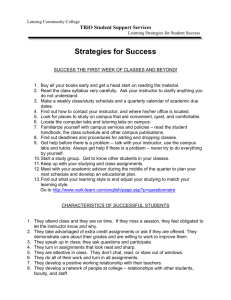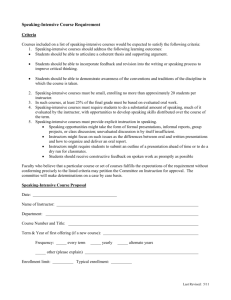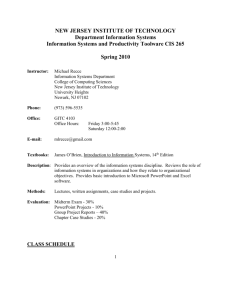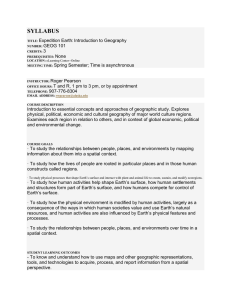RD College Seminar - University of Alaska Fairbanks
advertisement
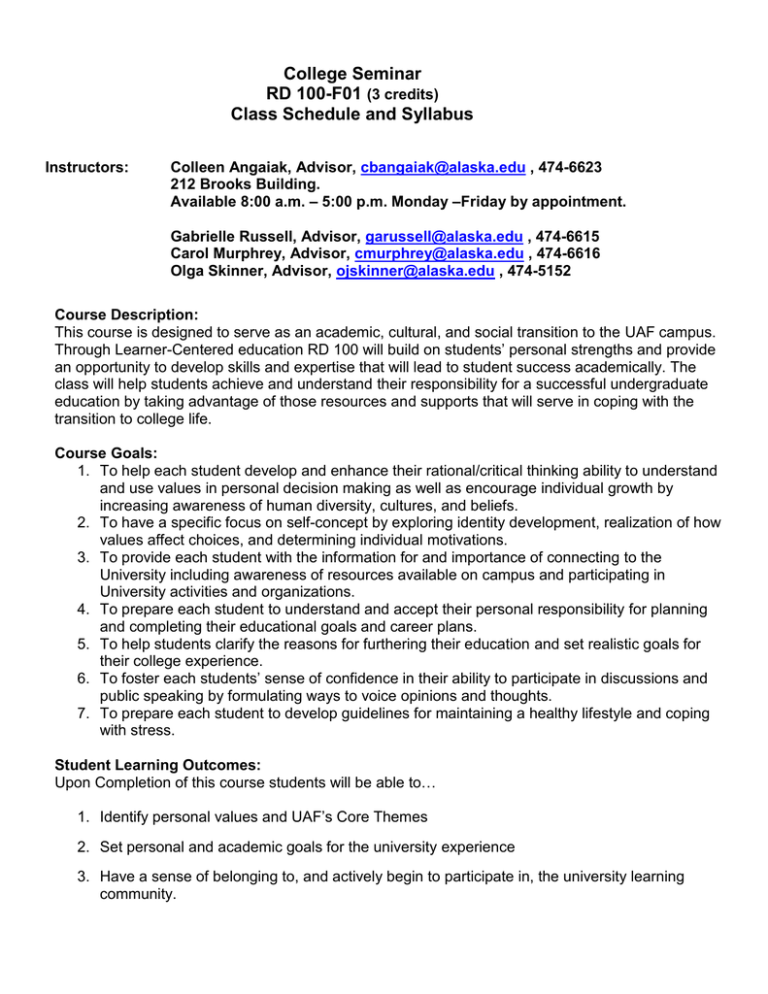
College Seminar RD 100-F01 (3 credits) Class Schedule and Syllabus Instructors: Colleen Angaiak, Advisor, cbangaiak@alaska.edu , 474-6623 212 Brooks Building. Available 8:00 a.m. – 5:00 p.m. Monday –Friday by appointment. Gabrielle Russell, Advisor, garussell@alaska.edu , 474-6615 Carol Murphrey, Advisor, cmurphrey@alaska.edu , 474-6616 Olga Skinner, Advisor, ojskinner@alaska.edu , 474-5152 Course Description: This course is designed to serve as an academic, cultural, and social transition to the UAF campus. Through Learner-Centered education RD 100 will build on students’ personal strengths and provide an opportunity to develop skills and expertise that will lead to student success academically. The class will help students achieve and understand their responsibility for a successful undergraduate education by taking advantage of those resources and supports that will serve in coping with the transition to college life. Course Goals: 1. To help each student develop and enhance their rational/critical thinking ability to understand and use values in personal decision making as well as encourage individual growth by increasing awareness of human diversity, cultures, and beliefs. 2. To have a specific focus on self-concept by exploring identity development, realization of how values affect choices, and determining individual motivations. 3. To provide each student with the information for and importance of connecting to the University including awareness of resources available on campus and participating in University activities and organizations. 4. To prepare each student to understand and accept their personal responsibility for planning and completing their educational goals and career plans. 5. To help students clarify the reasons for furthering their education and set realistic goals for their college experience. 6. To foster each students’ sense of confidence in their ability to participate in discussions and public speaking by formulating ways to voice opinions and thoughts. 7. To prepare each student to develop guidelines for maintaining a healthy lifestyle and coping with stress. Student Learning Outcomes: Upon Completion of this course students will be able to… 1. Identify personal values and UAF’s Core Themes 2. Set personal and academic goals for the university experience 3. Have a sense of belonging to, and actively begin to participate in, the university learning community. 4. Understand how to access university academic and student support resources 5. Discuss the relationship between motivation and achievement 6. Develop a sense of appreciation and respect for their own culture as well as cultures unique from theirs. 7. Develop a sense of responsibility to social justice issues and service to others both in and out of the classroom 8. Identify differences between high school and university, and rural and urban educational settings 9. Identify skills and knowledge that can be used in rural and urban settings. 10. Identify and utilize campus resources 11. Develop the practical skills necessary for academic success including note-taking and testtaking skills. 12. Develop strategies to cope with stress, including homesickness. Instructional Method: Class discussions Guest speakers Written and emailed homework assignments Small group discussion and activities Review of video and audio tapes Lecture Disability Services: The Office of Disability Services implements the Americans with Disabilities Act (ADA), and ensures that UAF students have equal access to the campus and course materials. Disability Services provides academic accommodations to enrolled students who are identified as being eligible for services. We make every effort to work in conjunction with the Office of Disability Services to provide the necessary accommodations for all identified students enrolled in our course. If you believe you are eligible, please contact Disability Services on the UAF campus at 907-4747043, fydso@uaf.edu. Or visit http://www.uaf.edu/disability/ on the web. Course Materials: There will be no need to purchase textbooks for this course. All course materials, handouts and readings will be provided to the class by the instructors. Reflective Journal (30%): Each student will keep a journal. The entries should be at least one paragraph in length (you are welcome to write more if you wish). The entries should show evidence of thoughtful reflection on topics which will be assigned each week in class. Entries will be submitted via email before the next class. Please do not use real names when discussing a classmate or instructor. Students’ journals will be reviewed only by the instructors and the contents kept confidential. If an instructor reasonably believes the contents of a journal reflect a possible danger to self or any third party, the instructor may take reasonable steps to prevent harm, including disclosing the journals contents to university officials or those deemed necessary in preventing any potential harm. Homework (20%): Each week there will be a homework assignment, please consult the syllabus. Midterm and Final: This class will include a midterm exam and a final exam. The midterm will be worth 15%, the final will be worth 25%, comprising 40% of the total grade. Class Attendance Requirements (10%): Late Arrivals and Early Departures: You must not only attend class, but you must arrive on time and remain in class for the entire period. Two unexcused late arrivals or early departures will count as one absence for the purpose of the attendance policy. Excused Absences: For an absence to be considered excused, proper documentation needs to be provided to the instructor. (ex. doctor’s note) The instructor has the right to initiate faculty withdrawals for any student who is missing classes and not participating substantially in the course. Appointments, Meetings that Conflict with Class: Please note that you should not schedule appointments with a doctor or dentist or anyone else that conflict with your class time (unless unavoidable). Policy on Missed Assignments and In-Class Activities: Assignments will not be accepted late, and students will not be permitted to make up missed in-class assignments. Exceptions will be made at the discretion of the instructor and will require appropriate documentation for illness, family emergency, or participation in University-sponsored activities. Make-up assignments: Students may be allowed to make up an assignment if an absence is excused. Communicate with your instructors and let them know what situation may be preventing your attendance. RD 100 Expectations for Classroom Behavior: As instructors, we will respect you as a student and will make every effort to maintain a classroom climate that promotes learning for all students. Students must accept their responsibility for maintaining a positive classroom environment. Students are expected to arrive to class on time because the class dynamic depends on everyone being present. Students may not leave or prepare to leave class until dismissed. Students are expected to be alert and attentive in class. Student/teacher relationships, as well as relationships among peers, must be respectful at all times. Students are not permitted to wear headphones or use other electronic devices that may be distracting to the classroom environment. Students must refrain from any activity that will disrupt the class. Cell phones turned off. Students should not carry on private conversations while class is being conducted. University Expectations: Attend all classes Be in class on time each day Bring the syllabus to class Complete all assignments in accordance with the assignment schedule Contribute positively to the learning experience of other students Refer to the syllabus to keep informed of upcoming assignments Check University e-mail daily for communications from your instructor and other university officials. Class break-down: The beginning of each class will be dedicated to a discussion of the homework due that day. Unless otherwise specified, assignments are due at the beginning of class on the due date. Reading and assignment dates may vary slightly depending on the pace of the class and other scheduled activities. Instructors will announce any adjustments to the schedule in class. The end of each class will be dedicated to an explanation and clarification of the following week’s homework. You are responsible for keeping up with assignments. If you miss a class for any reason, contact the instructor. Week 1 Introductions, getting to know each other; UAF Core themes, personal values; introduce student panel/mentors • Journal: List three personal values and how they will help you succeed in college. • Homework: Write a brief (3-5 pages) autobiography of your life until now. Week 2 Catalog, registration, deadlines, campus resources; differences between high school and college, especially rural schools; personal strengths, online assessment tool • Journal: Compare and contrast your 3 values with UAF’s core themes. What is your opinion of the core themes? • Homework: Collect puzzle pieces at various UAF locations Week 3 University vocabulary Jeopardy; GPA computation, and importance; why are we here? • Journal: What are you good at? How did you become good at it? How can you use this skill in college or in life after college? • Homework: GPA exercises Week 4 Time management note taking, including practice, classroom engagement. Role playing • Journal: Do you manage your time differently here than at home? How do you feel about your current schedule? • Homework: Time audit. Week 5 Study skills: Reading, writing, math test-taking • Journal: What makes a good teacher? Who is the best teacher you’ve ever had, and why • Homework: Learning styles activity Week 6 Stress & coping skills, student panel, priorities – home vs. school • • Journal: Think of a person you feel like you could talk to about almost anything. Who is it? How do they help you? Homework: For the next week, each evening write down three things that went well today and why they went well. Answer the question “Why did this happen?” It’s hard at first, but it gets easier. Week 7 Homesickness • Journal: If you could thank someone for something they’ve taught you, who would it be and why? Write them a short note thanking them for the help they’ve given you. • Homework: Study for midterm Week 8 Motivation, test preparation, Midterm. • Journal: List 3 goals you have for this semester. What are some things you can do to help achieve those goals? • Homework: Study for midterm Week 9 Registration, advising, academic planning, model advising appointment • Journal: Have any of your experiences this semester changed what you think about the classes you should take or your major? Do you feel different about this registration than the first time? • Homework: Create a 2- or 4-year academic plan. Week 10 Financial Aid basics – Ashley Munro guest speaker; loan reality activity; Application and Essay workshop, GPA calculation review • Journal: Who pays for your education? Do you feel any responsibility to people or agencies that are providing you with funding for college? • Homework: Update your scholarship essay, or write one if you don’t have one Due 11/13 Week 11 Career Services guest speaker, Resume and cover letter workshop, mock interview • Journal: What are your career goals? Where do you plan to live and work? • Homework: Schedule and attend mock interview at Career Services or RSS. Write a 24 page reflection on how this experience went. Week 12 Personal Budgeting, budgeting activity with jobs, salaries, expenses • Journal: What do you spend money on? How has this changed since you’ve come to Fairbanks? • Homework: Track what you spend for the next week. Week 13 Relationships, homework check – review spending, relationships • • Journal: Think of a person you feel like you could talk to about almost anything. Who is it? How do they help you? Homework: Tell a story you’ve heard or learned from an elder or family member. What lessons or values that are important to you are present in this story? You can write the story, record it, or create a visual presentation. Week 14 Diversity, cultural identity • Journal: What did you learn in your home community that is useful to you in college? What have you learned in college that will be useful to you in your home community? • Homework: Write 2-3 paragraphs to add to your autobiography to bring it up to date and include your first semester of college Week 14 Self-identity, values, UAF’s Core Themes, Final prep • Journal: Tell about an event in your life that has caused a change in you. What happened? How did you change? • Homework: Study for final Student Evaluation and Grading: Written Assignments must be double spaced and submitted to the instructor via E-mail. Work for this course is weighted as follows: Reflective Journal 30% Homework and In class activities 30% Midterm 15% Final 25% Class Attendance and Participation 10% You will be graded on each written assignment, activity/homework required in the course as indicated above. This class will not be using plus or minus grades in your final grade calculation. Grading Scale: 90-100 = A 80-89 = B 70-79 = C 60-69 = D 0-59 = F

